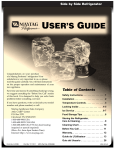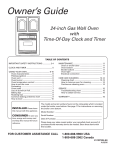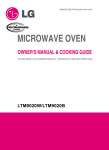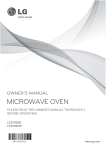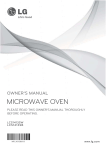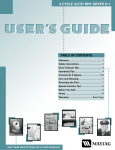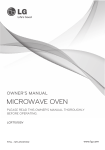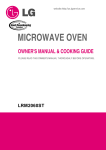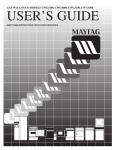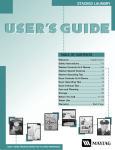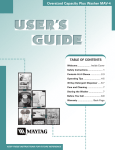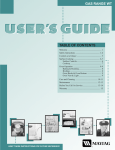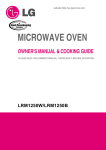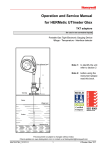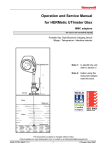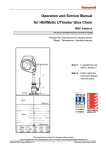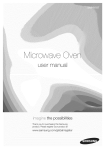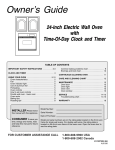Download Maytag MMC5000A User's Manual
Transcript
MICROWAVE OVEN TABLE OF CONTENTS Welcome ................................................... 1 Safety Instructions ............................ 2-3 Installation............................................... 3 Controls At A Glance ........................... 4 Touch Control Panel ............................. 5 Operating Basics............................... 6-10 Special Features ............................. 10-12 Care and Cleaning ............................... 13 Answers to Questions ........................ 13 Before You Call..................................... 14 Warranty.................................... Back Page KEEP THESE INSTRUCTIONS FOR FUTURE REFERENCE ® Model: MMC5000A PRECAUTIONS TO AVOID POSSIBLE EXPOSURE TO EXCESSIVE MICROWAVE ENERGY Welcome Welcome and congratulations on your purchase of a Maytag Microwave Oven! Your complete satisfaction is very important to us. Read this manual for best results. It contains instructions to acquaint you with proper operating and maintenance procedures. A. Do not attempt to operate this oven with the door open since open-door operation can result in harmful exposure to microwave energy. It is important not to defeat or tamper with the safety interlocks. Save time and money. If something should go wrong, we suggest consulting the “Before You Call” section in the back of this book. It is designed to help you solve basic problems before consulting a servicer. B. Do not place any object between the oven front face and the door or allow soil or cleaner residue to accumulate on sealing surfaces. However, should you need assistance, it is helpful to: 1) Have complete model and serial number identification of your microwave. This is located on a data plate on the left side of the oven opening. Record these numbers below for easy access. C. Do not operate the oven if it is damaged. It is particularly important that the oven door close properly and that there is no damage to the: (1) door (bent), (2) hinges and latches (broken or loosened), (3) door seals and sealing surfaces. Model Number D. The oven should not be adjusted or repaired by anyone except properly qualified service personnel. __ __ __ __ __ __ __ __ __ __ Serial Number __ __ __ __ __ __ __ __ __ __ Registration Federal law requires registration of all microwave ovens. To comply with the law, please fill out the CUSTOMER REGISTRATION CARD packaged in the oven. 2) Have proof of original date of purchase. Please save your sales receipt. For additional questions, please contact us: 1. Check the model and serial numbers on the card to see that they match the numbers on the data plate. The data plate is located on the left inside wall of the oven opening. If the numbers on the card are not the same as those on the data plate, cross out the numbers on the card and write in the numbers as they appear on the data plate. Maytag Appliances Sales Company Attn: CAIRSM Center P.O. Box 2370 Cleveland, TN 37320-2370 1-800-688-9900 (USA) 1-800-688-2002 (CANADA) 1-800-688-2080 (U.S. TTY for deaf, hearing impaired or speech impaired) (Mon.–Fri., 8am–8pm Eastern Time) Internet: http://www.maytag.com 2. Mail the card. The return address is included on the reverse side of card. If you move or are not the original owner of this oven, you must by law renew the registration. Send the renewal registration information to: Maytag Customer Service, Warranty Administration, P.O. Box 4970, Cleveland, TN 37320-4970. For service and warranty information, see back page. NOTE: In our continuing effort to improve the quality of our appliances, it may be necessary to make changes to the appliance without revising this guide. Renewal Registration information must provide: a) Your name and address and b) the microwave oven’s model and serial numbers. 1 IMPORTANT SAFETY INSTRUCTIONS When using electrical appliances, basic safety precautions should be followed, including the following: WARNING — To reduce the risk of burns, electric shock, fire, injury to persons or exposure to excessive microwave energy: sink, in a wet basement, or near a swimming pool, and the like. 14. Do not immerse cord or plug in water. 15. Keep cord away from heated surfaces. 16. Do not let cord hang over edge of table or counter. 17. When cleaning surfaces of door and oven that come together on closing the door, use only mild, non-abrasive soaps or detergents applied with a sponge or soft cloth. 18. To reduce the risk of fire in the oven cavity: a. Do not overcook food. Carefully attend appliance if paper, plastic, or other combustible materials are placed inside the oven to facilitate cooking. Avoid using recycled paper products. Do not use newspaper or other printed paper in the oven. Such products sometimes contain impurities which could ignite. b. Remove wire twist-ties from paper or plastic bags before placing in oven. c. If materials inside the oven should ignite, keep oven door closed, turn oven off, and disconnect the power cord, or shut off the power at the fuse or circuit breaker panel. d. Do not use the oven for storage. Do not leave paper products, cooking utensils or food in the oven when not in use. e. Do not pop popcorn except in a microwave approved popcorn popper or in a commercial package recommended especially for microwave ovens. 19. Do not operate the oven when empty or with an empty utensil. 20. Do not lean on the oven door. The door is designed to close tightly and seal properly for safe operation. Leaning on the door may warp or break the hinges. 21. To avoid exposure to dangerous high voltage, DO NOT REMOVE THE SPLATTER SHIELD inside the oven cavity. 22. Liquids heated in certain shaped containers (especially cylindrical-shaped containers) may become overheated and splash out with a loud noise. For best results, stir the liquid several times before heating. Always stir liquids several times between reheatings. Continued on next page. 1. Read all instructions before using the appliance. 2. Read and follow the specific “PRECAUTIONS TO AVOID POSSIBLE EXPOSURE TO EXCESSIVE MICROWAVE ENERGY” found on page 1. 3. This appliance must be grounded. Connect only to properly grounded outlet. See “GROUNDING INSTRUCTIONS” on page 3. 4. Install or locate this appliance in accordance with the provided installation instructions. 5. Some products such as whole eggs and sealed containers – for example, closed glass jars – may explode and should not be heated in this oven. In rare instances, poached eggs have been known to explode. Cover poached eggs and allow a standing time of one minute before cutting into them. 6. Foods with unbroken outer “skin” such as potatoes, sausages, tomatoes, apples, chicken livers and other giblets, and egg yolks (see previous caution) should be pierced to allow steam to escape during cooking. “Boilable” cooking pouches and tightly closed plastic bags should be slit, pierced, or vented. 7. Do not heat, store or use flammable materials in or near the oven. Fumes can create a fire hazard or explosion. 8. Use this appliance only for its intended use as described in this manual. Do not use corrosive chemicals or vapors in this appliance. This type of oven is specifically designed to heat, cook, or defrost food. It is not designed for industrial, laboratory, or commercial use. It is intended for home use only. Do not use for drying clothes, linens, newspaper, or similar nonfood type items. 9. As with any appliance, close supervision is necessary when used by children. 10. Do not operate this appliance if it has a damaged cord or plug, if it is not working properly, or if it has been damaged or dropped. 11. This appliance should be serviced only by qualified service personnel. Contact nearest authorized Maytag service facility for examination, repair or adjustment. 12. Do not cover or block any openings on the appliance. 13. Do not use or store this appliance outdoors. Do not use this product near water – for example, near a kitchen 2 IMPORTANT SAFETY INSTRUCTIONS 23. Read and follow specific microwave oven preparation instructions on food packages or containers (especially baby food). Above all, this is a cooking appliance designed to prepare food. 24. Use only cooking utensils and accessories made for use in the microwave and specifically described in this manual. 25. Microwave oven manufacturers do not recommend deep fat frying or frying in a microwave oven. Hot oil can damage oven parts and utensils and even result in skin burns. 26. Plastic wrap: Use only those types designed for microwave oven use and avoid forming an air-tight seal. Fold back a small corner or cut a small slit to allow steam to escape. 27. Stay near the appliance while it is in use and check cooking progress frequently. Leaving the appliance unattended may result in overcooked food and possibly a fire in your oven. 28. Built-in Installations: (Microwave must be built-in with a trim kit.) Do not mount any portion of the 29. 30. 31. 32. 33. (cont.) microwave oven over a sink or any other heating or cooking appliance unless the microwave oven has been approved for use above the heating appliance. See label on the trim kit for a list of approved heating appliances. See installation instructions for additional installation information. TV dinners may be microwaved in foil trays less than 3/4˝ deep; remove top foil cover and return tray to box. When using metal in microwave oven, keep metal at least 1 inch away from the sides of the oven. Do not defrost frozen beverages in narrow necked bottles. Cookware may become hot because of heat transferred from the heated food. Potholders may be needed to handle the cookware. Do not try to melt paraffin wax in the oven. Paraffin wax will not melt in a microwave oven because it allows microwaves to pass through it. Never use sharp-edged utensils in or near the oven. SAVE THESE INSTRUCTIONS Installation Instructions Remove all packing materials both outside and inside the oven before using the oven. The oven requires free movement of air for proper operation. Do NOT block air vents located underneath the oven. Also, do not remove the feet from the bottom of the oven. If it is absolutely necessary to use an extension cord, use only a 3-wire extension cord that has a 3-blade grounding plug, and a 3 slot receptacle that will accept the plug on the appliance. The marked rating of the extension cord shall be equal to or greater than the electrical rating of the appliance. Grounding Instructions Interference Note This appliance must be grounded. In the event of an electrical short circuit, grounding reduces the risk of electric shock by providing an escape wire for the electric current. This appliance is equipped with a cord having a grounding wire with a grounding plug. The plug must be plugged into a 120v, 15amp. outlet that is properly installed and grounded. Microwave ovens generate radio frequency energy during operation, and if not installed properly may cause interference to radio and television reception. You can determine if this unit is causing interference by turning it on and off while the interference is occurring. If interference occurs, it may be corrected by one or more of the following measures: WARNING – Improper use of the grounding plug can result in a risk of electric shock. • clean door and sealing surfaces of the oven; • reorient the television or radio receiving antenna; Consult a qualified electrician or service technician if the grounding instructions are not completely understood, or if doubt exists as to whether the appliance is properly grounded. • relocate the oven with respect to the television or radio receiver, and/or • plug the oven into a different outlet so that it and the television or radio receiver are on different circuits. Do not use an extension cord. If the power supply cord is too short, have a qualified electrician or serviceman install an outlet near the appliance. OR, If the interference persists, you may want to consult an experienced radio/television technician for additional suggestions. 3 Controls At A Glance COOKING GUIDE LABEL DATA PLATE DISPLAY WINDOW TOUCH CONTROL PANEL – (See more detailed diagram on page 5) LIGHT DOOR LEVER – Push to open the door. SAFETY INTERLOCK SYSTEM WINDOW – To view the foods – Safety latches are in the microwave oven door. All ovens have at least two latches which stop the operation of the oven when the door is opened. while cooking. No microwaves can pass through the metal shield in this window. TURNTABLE – Composed of glass tray and DOOR LATCH – These will slide into roller guide. The roller guide is placed first in the bottom of the microwave and supports the glass tray. Both parts must be in place when using the microwave oven. The turntable will rotate whenever the oven is in use. the interlock. If door is not completely closed, the oven will not operate. 4 Touch Control Panel DISPLAY WINDOW AUTO COOK PAD FROZEN PIZZA PAD – See page 11. – See page 11. POPCORN PAD WEIGHT PAD – See page 10. – See page 11. DRINK PAD – DINNER PLATE PAD See page 11. – See page 10. DEFROST PAD QUICK 30 SECONDS PAD – See page 6. – See page 8-9. CLOCK/AUTO START PAD – NUMBER PADS See page 6 & 12. POWER LEVEL PAD – See page 7. CLEAR/OFF PAD – Touch to stop cooking or clear Display of incorrect entry. START PAD – Touch to start cooking. Audible Signals Audible Signals are available to guide you when setting and using your oven: • A programming beep will sound each time you touch a pad. • One long beep will sound when the oven is first plugged in. • Three long beeps signal the end of a cooking cycle. • Three short beeps signal an incorrect entry. • Series of three short beeps signal you to check the food. 5 Operating Basics Time-of-Day Clock • After plugging in the oven or after a power outage, the Display will show “:0”. Set the clock following the directions above. Basic Instructions 1. Touch the Clock/Auto Start Pad. The Display will show “12H”. • The “time-of-day” clock is a 12 hour clock. 2. Set the time of day by touching the appropriate numbers. The set time will flash. • If set, the time of day will always be displayed when no other cooking function is being used. 3. Touch the Clock/Auto Start Pad. The set numbers will stop flashing, however, the colon continues to flash. Time Cooking Basic Instructions 1. Enter the cooking time by using the number pads. For example, for 1 1/2 minutes touch numbers 1, 3, 0.* * Note: Full power is automatic. If you wish to use a different power level, follow the instructions on page 7. 2. Touch the Start Pad. • Check the food as it cooks. • The cooking time will appear in the Display Window. • The oven door can be opened any time during operation. It will automatically stop and maintain the time setting until the door is closed and the Start Pad is touched again. • Start with the shortest recommended time and add more time as needed. • The oven will start cooking and time countdown will begin. • The oven will stop automatically when the time is done and beep three times. • The time of day will reappear in the Display. Quick 30 Seconds The Quick 30 Seconds Pad provides a convenient way to heat foods at full power with one touch of a pad. The microwave starts automatically after the pad is touched. By repeatedly touching the pad, you can heat foods from 30 seconds to 5 minutes. 6 Operating Basics Power Level Pad Basic Instructions 1. Touch the Power Level Pad.* 2. Enter the power level.** 3. Enter the cooking time. 4. Touch the Start Pad. * For HI, touch Power Level Pad Twice. ** See Power Level Guide below. Example: If the recipe calls for cooking with 50% power for 3 minutes, you would touch: the Power Level Pad; then 5 (“50” will appear in Display Window); then the number pads 3, 0, 0; then Start Pad. Power Level Guide* Power Level Power % HI 100 For vegetables; beverages; quick reheating (observe closely to avoid overcooking); generally for quickest cooking. 9 90 Sautéing vegetables. 8 80 For whole poultry, cheese and egg dishes; cooking certain seafood (clams, oysters or scallops). 7 70 6 60 5 50 4 40 3 30 2 20 1 10 Name Med Hi Suggested Uses For cakes, quick breads and muffins Reheating leftovers or for cooking recipes using precooked or canned ingredients. Med Reheating larger amounts of leftovers; cooking roasts. Stewing or developing flavor in main dishes, soups or sauces; cooking rice or pasta (after water is boiling); reheating pastries. Lo Defrosting; tenderizing less tender cuts of meat in liquid; cooking dried beans, lentils or peas in water. Softening cheese, butter or chocolate. Warm Keeping food(s) warm or taking chill off refrigerated foods before serving. * Guide gives percentage of magnetron “on” time at different power levels and suggested uses. 7 Defrost Pad Use the defrost setting for defrost meats, poultry and seafood from .5 pounds to 6.5 pounds. • Touch the Defrost Pad once for defrosting by weight. • Touch the Defrost Pad twice for defrosting by time. Defrost by Weight Defrosting by Time Basic Instructions 1. Touch the Defrost Pad once. Basic Instructions 1. Touch the Defrost Pad twice. 2. Enter the weight.* The defrosting time and power levels are automatically calculated and appear in the Display. 2. Enter the defrosting time. 3. Touch the Start Pad. • When defrosting by time, the microwave oven cycles on and off, alternating defrost and standing times. See Time Defrost Chart on page 9 for specific times and procedures. 3. Touch the Start Pad. * Enter the weight in pounds and tenths of a pound. See Conversion Chart below. • When the Start Pad is touched, the Time Defrost indicator starts blinking to show that the oven is in the Time Defrost mode. • During defrosting, the oven will beep a series of short beeps to signal that the food needs to be turned or rearranged. Oven will continue operating if food is not turned or rearranged. Three beeps signal the end of defrosting. • The Display counts down the time to show how much defrosting time is left. • During defrosting, the oven will beep a series of short beeps to signal that the food needs to be turned or rearranged. Oven will continue operating if food is not turned or rearranged. Three beeps signal the end of defrosting. Conversion Chart If weight is in ounces – then weight is converted to tenths-of-a-pound. 1 to 2-oz. 0.1 3 to 4-oz. 0.2 5-oz. 0.3 6 to 7-oz. 0.4 8-oz. 0.5 9 to 10-oz. 0.6 11 to 12-oz. 0.7 13-oz. 0.8 14 to 15-oz. 0.9 8 Operating Basics Time Defrost Chart Defrosting Time Standing Time 10-12 min. 18-20 min. 26-28 min. 5 min. 8-12 min. 7-10 min. 7-8 min. 5-7 min. Pork Roast, boneless/3 lbs. 26-28 min. 10-15 min. Pork Chops/1 lb. Ground Pork/1 lb. 7-8 min. 10-12 min. 15-16 min. 5-7 min. 5-7 min. 5-7 min. Whole Chicken/3 lbs. 20-22 min. 10-15 min. Chicken Breasts boneless/1 lb. Chicken Thighs/2 lbs. 7-8 min. 18-23 min. 5-7 min. 8-13 min. Turn chicken over. Shield wing tips, leg ends and breast areas with foil. Breast side down. Separate and rearrange once. Separate and rearrange once. 10-11 min. 5-7 min. Separate and rearrange once. Shield as needed. Items and Weight Procedures and Techniques Beef Ground Beef/1 lb. Ground Beef/2 lbs. Beef Roast, boneless/3 lbs. Steaks/1˝ thick Break apart and remove thawed portions with fork. Break apart and remove thawed portions with fork. Turn over when oven beeps. Shield ends or thinner areas with foil. Separate and rearrange once. Pork Spareribs/12 lbs. Turn over when oven beeps. Shield ends or thinner areas with foil. Separate and rearrange once. Break apart and remove thawed portions with fork. Turn meat over and rearrange, separate once. Poultry Fish Fish Fillets/1 lb. Defrosting Tips 7. During defrost (weight or time), the oven will prompt you to turn the food over. At this point, open oven door and check the food. Follow the techniques listed below for optimum defrost results. Then, close oven door, touch Start Pad to complete defrosting. 1. Do not defrost covered meat. Covering might allow cooking to take place. Always remove outer wrap and tray. Place food on a microwave-safe rack in a dish. During defrost, juices accumulate in dish and may become hot enough to cook the food. Elevating meat off of the dish will prevent the bottom and side from beginning to cook. • Turn Over: Roast, ribs, whole poultry, turkey breasts, hot dogs, sausages, steaks, or chops. • Rearrange: Break apart or separate steaks, chops, hamburger patties, ground meat, chicken or seafood pieces, chunks of meat such as stew beef. 2. Begin defrosting whole poultry breast-side-down. Begin defrosting roasts fat-side-down. 3. The shape of the package alters the defrosting time. Shallow rectangular shapes defrost more quickly than a deep block. • Shield: Use small strips of aluminum foil to protect thin areas, edges of unevenly shaped foods such as chicken wings. To prevent arcing, do not allow foil to come within 1-inch of oven walls or door. 4. Defrost by Weight is programmed for specific weights. Defrost results will be affected if you enter an incorrect weight. • Remove: To prevent cooking, thawed portions should be removed from the oven at this point. This may shorten defrost time for foods weighing less than 3-lbs. 5. Defrost by Weight is programmed for frozen food at 0° F. If food is stored at a higher temperature, expect shorter defrost times. 8. After defrosting, allow food to stand 10 to 20 minutes if there are any icy areas. If large solid roasts, such as sirloin tip or rump roasts, are not completely thawed after standing, return roast to oven and program Defrost by Weight for 1 lb. 6. After 1/3 of the defrost time has elapsed, check the food. You may wish to turn over, break apart, rearrange or remove thawed portions of the food. 9 Two Stage Cooking This feature lets you program two sequential operations such as defrosting and cooking or cooking using two different power levels. It automatically changes power settings and cooking time. • When the Start Pad is touched, both Memory 1 and 2 indicator lights come on in the Display. Memory 1 indicator light starts blinking during the first stage of cooking. At the end of the first stage of cooking, the oven will beep and Memory 2 indicator light starts blinking as the second stage of cooking starts. Basic Instructions 1. Touch the Power Level Pad.* • Three beeps signal the end of cooking. 2. Enter the power level. • The audible beep between stages can serve as a reminder to add foods or ingredients. 3. Enter the cooking time. 4. Touch the Power Level Pad.** 5. Enter the power level. 6. Enter the cooking time. 7. Touch the Start Pad. * If you wish to cook on HI, skip step 2. ** If you wish to cook on HI, skip steps 4 and 5. Special Features Popcorn Pad Dinner Plate Pad Basic Instructions 1. Touch the Popcorn Pad once for 3.5 oz. package or Basic Instructions 1. Touch Dinner Plate Pad. 2. Touch the Popcorn Pad twice for 1.75 oz. package. • The display will briefly show “11” and then “2:20” as cooking begins. • The Popcorn Pad has been automatically set for the correct cook time for 3-3.5 oz. and 1.75 oz. bags of popcorn. • Place meat and dense vegetables to the outside of the plate. • Place delicate foods in the center of the plate. • Listen as the popcorn pops and stop the microwave when the popping slows down to 3 seconds apart. • Cover the plate with wax paper to hold steam around most foods except rare meats or vegetables with crisp exteriors. • Do not try to repop unpopped kernels or reuse a bag. • Pop only one package at a time. 10 Special Features Frozen Pizza Basic Instructions 1. Touch the Frozen Pizza Pad. • The Display will briefly show “7” and then start cooking. • Cook only one pizza at a time weighing approximately 7 oz. • Follow manufacturer’s directions. • Use only frozen pizza labeled microwaveable. Drink Pad Basic Instructions 1. Touch the Drink Pad once for 1 cup/mug. 2. Touch the Drink Pad twice for 2 cups/mugs. 3. Touch the Drink Pad three times for 3 cups/mugs. Auto Cook Auto Cook Code Basic Instructions 1. Touch the Auto Cook Pad until the food category desired is displayed.* Code Food Item 2. Touch the Weight Pad until the number in the Display is the quantity desired.* AC-1 Baked Potato 1-Touch Weight Pad once. 2-Touch Weight Pad twice. 3-Touch Weight Pad three times. * Note: See chart below or the cooking Guide Label on the front of the oven cavity. AC-2 Fresh Vegetable 8 oz. - Touch Weight Pad once. 12 oz. - Touch Weight Pad twice. AC-3 Soup 8 oz. - Touch Weight Pad once. 12 oz. - Touch Weight Pad twice. • Auto Cook has preset times and power levels for three food categories: baked potatoes, fresh vegetables and soup. • The Display will show cooking time and the oven automatically starts cooking. 11 Quantity Auto Start The Auto Start feature allows you to program your oven to begin cooking at a preset time of day – up to a delay of 11 hours and 59 minutes. You can program two sequential operations using two different power levels. • You cannot use the Auto Start with the following options: Popcorn, Frozen Pizza, Drink, Dinner Plate, Defrost and Auto Cook. • Do not use foods containing baking powder or yeast when using Auto Start. They will not rise properly. Basic Instructions 1. Touch the Power Level Pad. • Warning: Do not use foods that will spoil while waiting for cooking to start, such as dishes with milk or eggs, cream soups and cooked meats or fish. Any food that has to wait for cooking to start should be very cold or frozen before it is put in the oven. Unfrozen foods should never stand more than two hours before cooking starts. 2. Enter the power level. 3. Enter the cooking time.* 4. Touch the Power Level Pad. 5. Enter the power level. 6. Enter the cooking time. Do not allow food to remain in the oven for more than two hours after end of cooking cycle. 7. Touch the Clock/Auto Start Pad. 8. Enter the clock time you want the oven to start. To check Auto Start Time 9. Touch the Start Pad.** Touch the Clock/Auto Start Pad. The programmed Auto Start time will appear in the Display for 3 seconds. * If you wish to cook with one Stage, omit steps 4, 5 & 6. ** The oven will start cooking at the set time. If the door is opened before the start time is reached, touch the Start Pad to resume the Auto Start option. Tips on setting Auto Start • Before setting, check that the correct time of day is displayed. • If you hear the fan start when you touch the Start Pad, you have not set the oven properly. Touch the Clear/Off Pad and start over. Child Safety Lock The oven operation can be locked to prevent a child from accidentally turning it on. All oven functions can be locked. To set: Touch and hold the Clear/Off Pad for three seconds. The lock indicator lights and the oven beeps. To cancel: Touch and hold the Clear/Off Pad for three seconds. The lock indicator light goes off and the oven beeps. 12 Care and Cleaning Cleaning the Microwave Oven Interior Oven Bottom Wash oven bottom with hot sudsy water, rinse and dry. Do not use excessive amounts of water when cleaning the oven, especially around the turntable. Do not allow water or cleaning agents to seep into turntable gears located underneath. The oven interior should be cleaned after each use with a damp cloth to keep it free from grease and soil buildup. Stubborn soils can be removed with a plastic scrub pad. When cleaning interior surfaces and surfaces of door and oven that come together when the door is closed, use only mild, non-abrasive soaps or detergents applied with a sponge or soft cloth. Glass Tray/Turntable Odors can be eliminated from the inside of the oven by boiling a solution of one cup of water and several tablespoons of lemon juice in the oven for 5-7 minutes. This also helps loosen any dried soil in the oven. Wipe off excess moisture after use. Allow to cool before removing and cleaning. Wash in soapy water or dishwasher. Do not spray or pour liquid cleansers directly onto a surface. Spray or pour cleanser onto a cloth or sponge and then clean. Clean frequently to prevent excessive noise. Wash in soapy water or dishwasher. Do not use abrasive cleaners, oven cleaners, abrasive cleaning pads or steel wool, as they can scratch or dull oven surfaces. Oven Light Bulb Roller Guide This bulb is to be replaced by properly qualified service personnel. Do not remove or insert knife around the stirrer cover to clean, it may damage the cover or affect the cooking performance of your oven. Answers to Questions About Your Microwave Oven Q. What do the various beeps mean? A. Short beep = any pad is touched. Q. Can I open the door when the oven is operating? A. The door can be opened anytime during the cooking operation. The oven will automatically stop cooking and the time setting will maintain until the door is closed and the Start Pad is touched. Three short beeps = incorrect entry. One long beep = oven plugged in. Three long beeps = end of cooking (microwave will turn off). Q. What causes the oven interior light and display to dim when using a Variable Power Level? A. This is normal and indicates the oven is operating and cycling properly. Series of three short beeps = check food to see if turning or rearranging is needed. Q. Can the oven be used with the glass tray or roller guide removed? A. No. Both the glass tray and roller guide must always be used in the oven when cooking. Q. Why does steam and/or vapor escape around the door and moisture droplets form on the inside of the oven door? A. This is normal occurrence – as food cooks, steam is given off. 13 Before You Call Check the following to be sure a service call is really necessary. If nothing on the oven operates: If the interior of oven collects moisture: • check for a blown circuit fuse or a tripped main circuit breaker. • this is normal. Food gives off moisture when cooking and the steam collects on the door and the oven surface. Wipe off excess moisture from oven after each use. • check if oven is properly connected to electric circuit in house. • check that controls are set properly. If food cooks unevenly: • check that the cooking time is set. • refer to your recipe for proper cooking procedures. If the oven interior light does not work: • be sure food is evenly shaped. • the light bulb may be loose or defective. Call a qualified servicer. • be sure food is completely defrosted before cooking. • check placement of aluminum strips used to prevent overcooking. If oven will not cook: • check that control panel was programmed correctly. If food is undercooked: • check that door is firmly closed. • check recipe to be sure all directions (amount, time, and power levels) were correctly followed. • check that Start Pad was touched. • check household voltage. • Auto Start may have been set. • try plugging the oven into an outlet on a separate electrical circuit. • the Child Safety Lock may have been set. • be sure food was completely defrosted before cooking. If oven takes longer than normal to cook or cooks too rapidly: • be sure the Power Level is programmed properly. If food is overcooked: • check instructions on food density, etc. • check recipe to be sure all directions (amount, time, and power levels) were correctly followed. • verify that voltage to the microwave oven is not low. • the initial temperature of food may have been higher than normal. If the time-of-day clock does not always keep correct time: • check that the power cord is fully inserted into the outlet receptacle. If arcing (sparks) occur: • check that the oven is properly grounded. • be sure wire twist ties weren’t used. • try plugging the oven into an outlet on a separate electrical circuit. • be sure oven wasn’t operated when empty. If oven floor or glass tray are hot: If the display shows a time counting down but the oven is not cooking: • this is normal. The floor is absorbing heat from the food. • check that door is firmly closed. • be sure microwave-safe dishes were used. For further assistance contact your Maytag Dealer or call Maytag Customer Service: U.S. 1-800-688-9900 or Canada 1-800-688-2002 14 W Y T RRAN A Microwave Oven Warranty Full Two Year Warranty For two (2) years from the date of original retail purchase, any part which fails in normal home use will be repaired or replaced free of charge. Limited Parts Warranty After the second year from the date of original retail purchase through the fifth year, the following parts which fail in normal home use will be repaired or replaced free of charge for the part itself, with the owner paying all other costs, including labor, when the appliance is located in the United States or Canada: (1) Touch pad and microprocessor, (2) Magnetron tube, (3) High voltage transformer, (4) High voltage capacitor (5) High voltage rectifier. Limited Parts Warranty Outside the United States or Canada For one (1) year from the date of original retail purchase, any part which fails in normal home use will be repaired or replaced free of charge for the part itself, with the owner paying all other costs, including labor, when the appliance is located outside the United States or Canada. Canadian Residents This warranty covers only those appliances installed in Canada that have been listed with Canadian Standards Association unless the appliances are brought into Canada due to transfer of residence from the United States to Canada. What is Not Covered by These Warranties 1. Conditions and damages resulting from any of the following: a. Improper installation, delivery or maintenance. b. Any repair, modification, alteration, oradjustment not authorized by the manufacturer or an authorized servicer. c. Misuse, abuse, accidents or unreasonable use. d. Incorrect electric current, voltage or supply. e. Improper setting of any control. 2. Warranties are void if the original serial numbers have been removed, altered, or cannot be readily determined. 3. Light bulbs. 4. Products purchased for commercial or industrial use. 5. The cost of service or service call to: a. Correct installation errors. b. Instruct the user on the proper use of the product. c. Transport the appliance to the servicer. 6. Consequential or incidental damages sustained by any person as a result of any breach of these warranties. Some states do not allow the exclusion or limitation of consequential or incidental damages, so the above exclusion may not apply. If You Need Service • Call the dealer from whom your appliance was purchased or call Maytag Appliances Sales Company, Maytag Customer Assistance at 1-800-688-9900, USA or 1-800-688-2002, CANADA to locate an authorized servicer. • Be sure to retain proof of purchase to verify warranty status. Refer to WARRANTY (above) for further information on owner’s responsibilities for warranty service. • If the dealer or service company cannot resolve the problem, write to Maytag Appliances Sales Company, Attn: CAIRSM Center, P.O. Box 2370, Cleveland, TN 37320-2370, or call 1-800-688-9900, USA or 1-800-688-2002, CANADA. U.S. customers using TTY for deaf, hearing impaired or speech impaired, call 1-800-688-2080. NOTE: When writing or calling about a service problem, please include the following information: a. Your name, address and telephone number; d. A clear description of the problem you are having; b. Model number and serial number; e. Proof of purchase (sales receipt). c. Name and address of your dealer or servicer; • User’s guides, service manuals and parts catalogs are available from Maytag Appliances Sales Company, Maytag Customer Assistance. MAYTAG • One Dependability Square • Newton, Iowa 50208 Form No. A/04/99 Part No. 8112P155-60
















